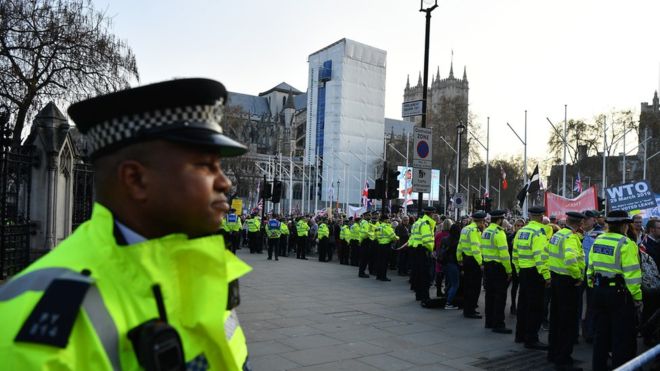Brexit: Police warn MPs and campaigners not to inflame tensions

Politicians and campaigners should take care not to “inflame” tensions in the UK caused by Brexit, a senior police chief has warned.
Chairman of the National Police Chief Council (NPCC), Martin Hewitt, said people should think carefully to avoid inciting others to violence.
Police have 10,000 officers ready to deploy at 24 hours’ notice as part of possible no-deal Brexit preparations.
However, police chiefs said the measures were only a precaution.
Mr Hewitt said the NPCC was preparing for the “worst case scenario” and was not predicting major problems.
Chief Constable Charlie Hall, the NPCC lead for operations, also said there was no intelligence to suggest there would be a rise in crime or disorder because of Brexit, although forces were “prepared to respond to any issues that may arise”.
The warnings follow increased concern about intimidation of MPs.
Mr Hewitt said the UK was in “an incredibly febrile atmosphere” as a result of the debate over leaving the EU and there was a lot of “angry talk” on social media.
He said: “I think there is a responsibility on those individuals that have a platform and have a voice to communicate in a way that is temperate and is not in any way going to inflame people’s views.”
Officers in charge of policing Parliament said they had seen an increase in abuse aimed at politicians and several MPs have requested increased security.
Only a small number of crimes have been linked directly to Brexit, police said, with about half being malicious communications, while the rest included verbal abuse, harassment and offences committed during protests.
But hate crimes remain higher than before the 2016 EU referendum.
In 2017-18, there were 94,098 hate crimes recorded, a 17% rise that is thought to have also been fuelled by the terror attacks in London and Manchester.
After warnings of disruptions at the border and to food supply chains if the UK leaves without a deal, police said they had plans to deal with incidents such as problems on the roads, major protests or even rioting and looting.
Read more (BBC News)

